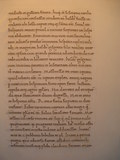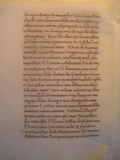Cleveland Public Library Leaf 39
This leaf comes from a rare manuscript of Livy's History of Rome (completed in about 9 A.D.) copied in Italy in the middle of the fifteenth century. It measures 22.5 x 16 cm and its vellum is very well prepared, though some rubbing of the ink has cast a shadow over the text block of some pages. The Humanistic script is crisp, clear, and without adornment; an exception is the Denison leaf, with its striking initial "H." See Denison University Leaf 39 for more information about this manuscript.
Text: This leaf contains the text of Livy's History, Book 27, Chapters 20-21. The English translation is that of Cyrus Edmonds (1850), via Project Gutenberg.
 Cleveland Leaf 39 Recto
Cleveland Leaf 39 Recto
Cleveland Public Library Leaf 39 Recto
 Cleveland Leaf 39 Recto Transcription
Cleveland Leaf 39 Recto Transcription
traducti in Galliam forent. itaque etiam si senatus Carthaginiensium non censuisset, eundum tamen Hasdrubali fuisse in Italiam ubi belli caput rerumque summa esset, simul ut Hispanos omnes procul ab nomine Scipionis ex Hispania abduceret. exercitum eius cum transitionibus tum aduerso proelio imminutum Hispanis repleri militibus, et Magonem Hasdrubali Gisgonis filio tradito exercitu ipsum cum grandi pecunia ad conducenda mercede auxilia in Baliares traicere; Hasdrubalem Gisgonis cum exercitu penitus in Lusitaniam abire, nec cum Romano manus conserere; Masinissae ex omni equitatu quod roboris esset tria milia equitum expleri, eumque uagum per citeriorem Hispaniam sociis opem ferre, hostium oppida atque agros populari;—his decretis, ad exsequenda quae statuerant duces digressi. haec eo anno in Hispania acta. Romae fama Scipionis in dies crescere, Fabio Tarentum captum astu magis quam uirtute gloriae tamen esse, Fului senescere fama, Marcellus etiam aduerso rumore esse, superquam quod primo male pugnauerat, quia uagante per Italiam Hannibale media aestate Uenusiam in tecta milites abduxisset. inimicus erat ei C. Publicius Bibulus tribunus plebis. is iam a prima pugna quae aduersa fuerat adsiduis contionibus infamem inuisumque plebei Claudium fecerat, et iam
 Cleveland Leaf 39 Recto Translation
Cleveland Leaf 39 Recto Translation
...or were marched over into Gaul. That, therefore, though the Carthaginian senate had not decreed it, Hasdrubal must, nevertheless, march into Italy, the principal seat and object of the war; and thus at the same time lead away all the Spanish soldiers out of Spain far from the name of Scipio. That the army, which had been diminished by desertions and defeats, should be recruited by Spanish soldiers. That Mago, having delivered over his army to Hasdrubal, son of Gisgo, should himself pass over to the Baleares with a large sum of money to hire auxiliaries; that Hasdrubal, son of Gisgo, should retire with the army into the remotest part of Lusitania, and avoid an encounter with the Romans. That a body of three thousand horse should be made up for Masinissa, the flower of the whole cavalry; and that he, shifting about from place to place throughout hither Spain should succour their allies and commit depredations on the towns and lands of their enemies." Having adopted these resolutions, the generals departed to put in execution what they had resolved on. Such were the transactions in Spain of this year. At Rome the reputation of Scipio increased daily. The capture of Tarentum, though effected by artifice more than valour, was considered honourable to Fabius. The fame of Fulvius was on the wane. Marcellus was even under an ill report, not only because he had failed in his first battle, but further, because while Hannibal was going wherever he pleased throughout Italy, he had led his troops to Venusia in the midst of summer to lodge in houses. Caius Publicius Bibulus, a tribune of the people, was hostile to him. This man, ever since the time of his first battle which had failed, had in constant harangues made Claudius obnoxious and odious to the people...
 Cleveland Leaf 39 Verso
Cleveland Leaf 39 Verso
Cleveland Public Library Leaf 39 Verso
 Cleveland Leaf 39 Verso Transcription
Cleveland Leaf 39 Verso Transcription
de imperio abrogando eius agebat cum tamen necessarii Claudii obtinuerunt ut relicto Uenusiae legato Marcellus Romam rediret ad purganda ea quae inimici obicerent nec de imperio eius abrogando absente ipso ageretur. forte sub idem tempus et Marcellus ad deprecandam ignominiam et Q. Fuluius consul comitiorum causa Romam uenit. [21] Actum de imperio Marcelli in circo Flaminio est ingenti concursu plebisque et omnium ordinum. accusauit tribunus plebis non Marcellum modo, sed omnem nobilitatem: fraude eorum et cunctatione fieri ut Hannibal decimum iam annum Italiam prouinciam habeat, diutius ibi quam Carthagine uixerit; habere fructum imperii prorogati Marcello populum Romanum; bis caesum exercitum eius aestiua Uenusiae sub tectis agere. hanc tribuni orationem ita obruit Marcellus commemoratione rerum suarum ut non rogatio solum de imperio eius abrogando antiquaretur, sed postero die consulem eum ingenti consensu centuriae omnes crearent. additur collega T. Quinctius Crispinus, qui tum praetor erat. postero die praetores creati P. Licinius Crassus Diues pontifex maximus, P. Licinius Uarus Sex. Iulius Caesar Q. Claudius. Comitiorum ipsorum diebus sollicita ciuitas de Etruriae defectione fuit. principium eius rei ab Arretinis
 Cleveland Leaf 39 Verso Translation
Cleveland Leaf 39 Verso Translation
...and now his object was to deprive him of his command. The connexions of Marcellus, however, then obtained leave that Marcellus, leaving a lieutenant-general at Venusia, should return to Rome to clear himself of the charges which his enemies were urging, and that the question of depriving him of his command should not be agitated during his absence. It happened that nearly at the same time, Marcellus, and Quintius Fulvius the consul, came to Rome, the former to exonerate himself from ignominy, the latter on account of the elections. [21.] The question touching Marcellus's command was debated in the Flaminian circus, in the presence of an immense concourse of plebeians and persons of every rank. The plebeian tribune accused, not only Marcellus, but the nobility generally. "It was owing," he said, "to their dishonesty and dilatory conduct, that Hannibal occupied Italy, as though it were his province, for now ten years; that he had passed more of his life there than at Carthage. That the Roman people were enjoying the fruits of the prolonged command of Marcellus; that his army, after having been twice defeated, was now spending the summer at Venusia lodged in houses." Marcellus so completely destroyed the effect of this harangue of the tribune, by the recital of the services he had rendered, that not only the bill for depriving him of his command was thrown out, but the following day he was created consul by the votes of all the centuries with wonderful unanimity. Titus Quinctius Crispinus, who was then praetor, was joined with him as his colleague. The next day Publius Licinius Crassus Dives, then chief pontiff, Publius Licinius Varus, Sextus Julius Caesar, and Quintus Claudius Flamen were created praetors. At the very time of the election, the public were thrown into a state of anxiety relative to the defection of Etruria. Caius Calpurnius, who held that province as propraetor, had written word that the Arretians...